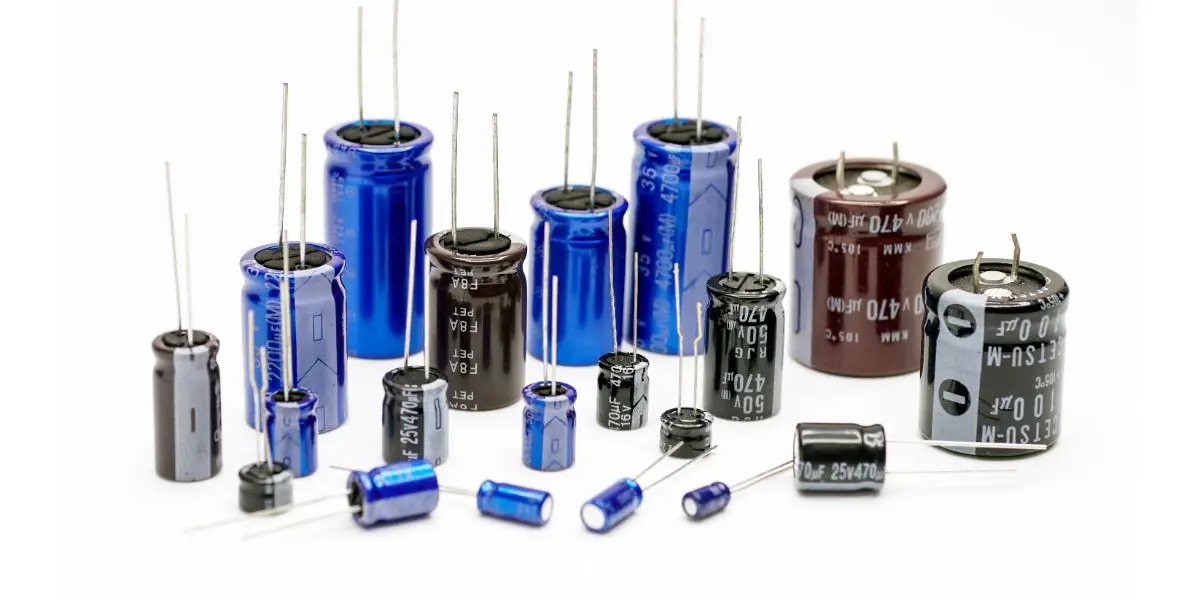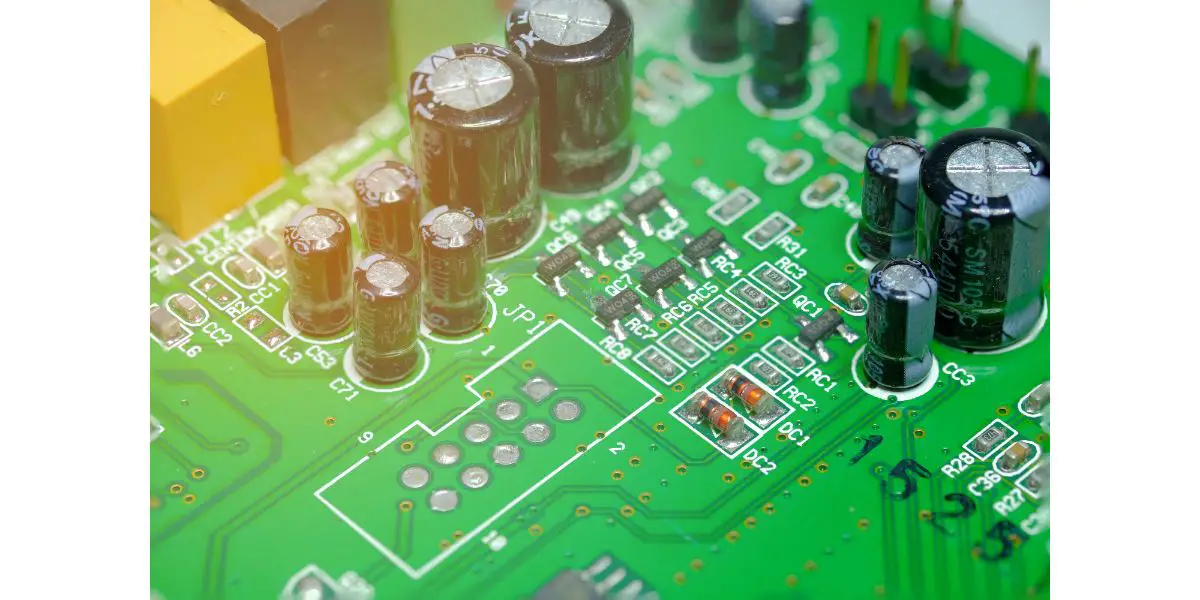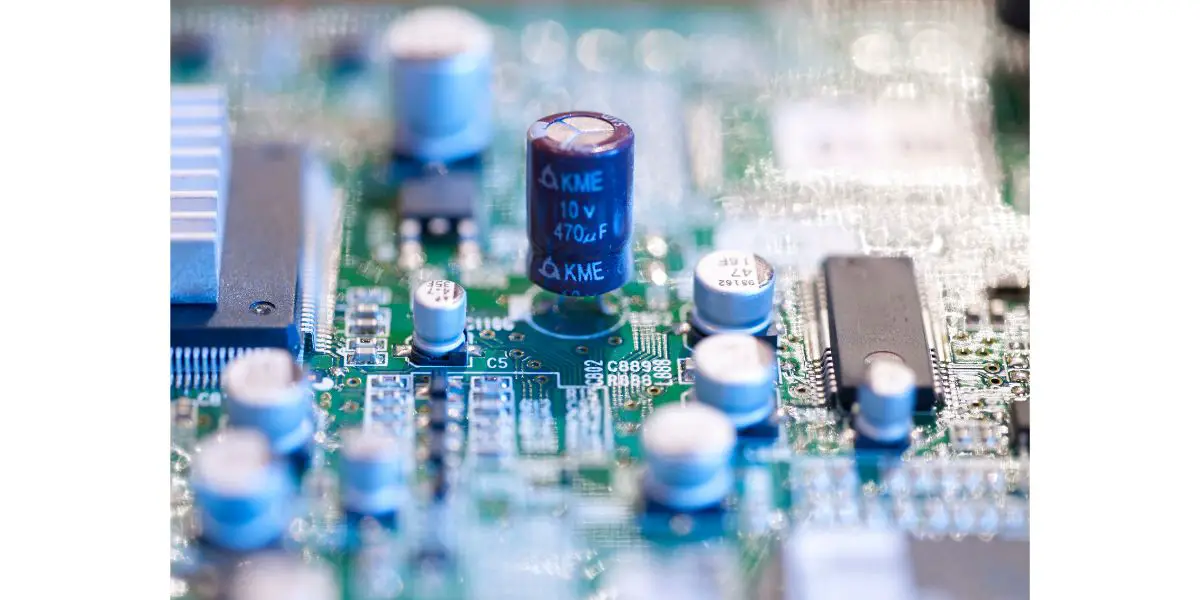Disclaimer: This post may contain affiliate links, meaning we get a small commission if you make a purchase through our links, at no cost to you. For more information, please visit our Disclaimer Page.
The motherboard is the most prominent part of a desktop computer — it’s connected to every component of your system. When holding one, you’ll immediately notice its seemingly-excessive number of capacitors. So, why are capacitors used in motherboards, and why do we need so many of them?
Table of Contents
Why Do Motherboards Have So Many Capacitors?
Motherboards have numerous capacitors because they help ensure smooth and stable operation. These capacitors regulate the electricity flowing through the circuit board, making it possible for people to use their computers reliably.
To better understand why motherboards need capacitors, we must look into what capacitors are and their role in electrical systems.
What Are Capacitors?
Electrolytic or motherboard capacitors are small, cylindrical (drum-like) objects installed near a power circuit. A capacitor can store an electrical charge that the board can use to help reduce voltage fluctuations.
Capacitors are similar to batteries in that they can store potential energy. The only difference is that capacitors store energy on the electric field, while batteries store potential energy by turning it into chemical energy.
Another difference is that capacitors constantly work to ensure smooth operation, while batteries work on demand.
With the help of capacitors, circuit boards can maintain consistent power flow. Capacitors regulate delivery by storing power when there’s an excess and releasing it when the board needs more power. This is a vital functionality, especially for motherboards undergoing varying power fluctuations.
The amount of power a capacitor can store depends on its capacitance range and voltage rating. Capacitors on different power circuits need different capacitance ranges and voltage ratings, which explains why the capacitors on a motherboard also vary in appearance.
The more fluctuations there are on a circuit, the higher the capacitance range should be.
Why Are Capacitors Useful In Motherboards?
A motherboard is connected to many computer components, requiring different power levels at any given time.
Your CPU, GPU, and RAM will operate at different levels and consume power depending on the resources your task requires. This creates a massive variance in the power that goes through the motherboard, which can be detrimental to your computer.
Aside from varying resource requirements, the clock signals that different components use also varies. These fluctuations can cause many issues with a computer’s operation.
It also makes the other parts more susceptible to electrical damage. Your system needs to keep the power stable to ensure your computer works properly and smoothly.
With the help of capacitors, your motherboard gets a much smoother, more stable, and more accurate power delivery, which is crucial for a computer.
Since a motherboard is connected to many components that require power regulation, manufacturers must install several capacitors to ensure smooth operation.
The more components connected to a motherboard, the more capacitors it needs to regulate power delivery. That’s why you’ll find more capacitors on high-end motherboards, despite being less “visible” than on lower-tier motherboards.
Having more capacitors makes the operation smoother and ensures that all the components within your system will run properly regardless of their workload.
What Happens When a Motherboard Capacitor Becomes Faulty?
Now that we know how vital capacitors are for computers, it’s time to discuss what happens when your motherboard is dealing with faulty capacitors.
Here are three tell-tale signs that you have a faulty capacitor on your motherboard:
1. High-Pitched Sounds Under Heavy Load
You might be dealing with faulty capacitors if you’re running resource-intensive programs on your computer and your system makes high-pitched or buzzing sounds. Voltage fluctuations can produce these sounds due to a lack of capacity to regulate power.
Your computer may still work when you’re not using resource-intensive programs because the fluctuations are fewer and far between. However, your computer might malfunction as soon as you start using more programs or resources.
Faulty capacitors may be detrimental to your motherboard’s longevity.
2. The System Freezes or Crashes
Since almost every component of your computer is connected to the motherboard, faulty capacitors may prevent your entire system from working properly. This can lead to several issues related to different components’ functions.
However, one of the most common issues you’ll encounter is a system crash or freeze. If one of the components connected to the motherboard isn’t getting stable power, it’ll stop its operation to prevent permanent electrical damage.
Since the operating system doesn’t have instructions on handling such events, your computer will unexpectedly halt all of its operations, resulting in a system crash.
Although it’s possible to still use your computer after resetting, it would be better for you to have your system checked. Faulty capacitors won’t prevent your computer from working, but frequent exposure to voltage fluctuations can significantly affect its longevity.
If you’re experiencing system freezes when using your computer, you might have to look at your motherboard to see if a faulty capacitor is causing the issue.
People who think their system crash is due to a software malfunction may spend more to repair or replace their system than if they checked their motherboard capacitors.
3. Overheating or Malfunctioning Components
If you’re using a program to monitor your computer’s temperature and notice a spike that has never happened in the past, you might be dealing with capacitors that fail to regulate voltage fluctuations in your motherboard.
The voltage should always be stable when using your computer to ensure every component works properly. When the capacitors fail, there won’t be anything to regulate the power, which can cause the components to draw too much power and result in overheating.
If you’re only using basic programs and you’re still getting temperature spikes, it would be best to check your capacitors and see if there are busted ones that prevent your computer from getting stable voltage and smooth operation.
Even if you have to replace your motherboard to eliminate the faulty capacitors, it will still be a better option than replacing every part of your computer. Although capacitors rarely get damaged, it’s still possible, and its consequences may be severe to the point of costing you your entire system.
Can You Still Use a Motherboard Without Capacitors?
If your motherboard has faulty capacitors, it will still function, but not how it would if you had all the capacitors working properly.
As mentioned, faulty capacitors can cause many issues on your computer. You have to repair them as soon as possible to prevent permanent electrical damage to other parts of your computer.
A motherboard will only function properly without capacitors if the missing ones are for a component you’re not using on your system. There’s nothing that draws power to it, and there’s nothing to regulate, allowing the motherboard to still work properly.
However, your computer won’t work if your motherboard doesn’t have capacitors for the components you need on your build. The motherboard won’t be able to regulate power spikes, which are common in computer parts. The worst case is that your CPU, GPU, or RAM gets permanently damaged when you turn on your computer.
Can You Replace a Faulty Capacitor?
You can replace capacitors on your motherboard, but it’ll require extensive knowledge of circuit boards. You’ll have to locate and unsolder the busted capacitor, then replace it with a fully functioning capacitor that has the same capacitance range and voltage rating as the one installed on it.
Aside from this, you also need to ensure you’re soldering the capacitor properly to prevent damaging the other parts of the motherboard. This task can take a lot of time, and given the number of capacitors on a motherboard, a person without enough experience may find the replacement process quite challenging.
You should bring your motherboard to a technician for a proper diagnosis and repair. They have enough experience to replace busted capacitors without risking the other parts of your computer.
You may also consider upgrading your motherboard when you encounter a busted capacitor. It’s rare for motherboard capacitors to fail unless you use a cheap, low-quality motherboard from an off-brand manufacturer.
An example of a high-quality capacitor is the Nichicon 12K Black Caps, used for Asrock mothers, with a guaranteed lifespan of 12,000 hours at 105°C.
This rating means you’d have to use your computer for 500 days straight, maintaining a 105°C temperature at all times before the capacitors start to degrade. If your computer operates at a much lower temperature than 105°C (most people won’t even get above 80°C), your capacitors will last longer.
If you’re dealing with faulty capacitors, it could only mean that your motherboard is either too old or an off-brand needing replacement. Both scenarios are excellent opportunities for you to consider upgrading your motherboard.
Conclusion
Capacitors are essential for a motherboard because they help regulate power delivery and ensure smooth operation. Without them, you’ll experience several issues with your computer, and in some cases, your system won’t even work. So, you must ensure that your motherboard always has properly working capacitors.



